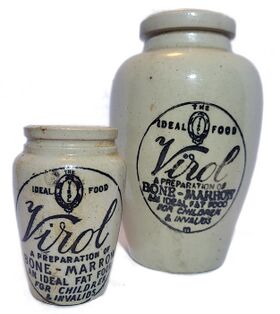Virol
From Kook Science
Virol (from Latin: vir, "man" + -ol, oleum, "oil") was a British trademarked name applied to a preparation of malt extract and fat (originally red bone marrow from processed beef) that was marketed as an "ideal fat food for children and invalids," supposed to be superior to alternatives such as cod-liver oil. The product was manufactured by Bovril Ltd. beginning in 1899 remained on the market in various forms until the 1980s.
Formula
A formula given in 1920s advertising indicated that Virol consisted of: red bone marrow from beef, extracted from ox rib and calves bones; refined marrow and beef fat; diastatic malt extract; eggs; lemon syrup; and soluble phosphates (i.e. calcium, iron, &c.).
Some thirty years on, in the 1950s, Virol placed less emphasis on the marrow content and was advertised as having the following ingredients: malt extract; refined beef fat; maltose; sugar; malto-dextrins; glucose; fructose; egg; orange juice; salt; flavourings; phosphoric acid; calcium phosphate; iron phosphate; sodium iodide; and added vitamins.
Manufacturers
- Bovril Ltd. & Virol Ltd., 1899-1971
- Cavenham bought out Bovril Ltd. (and Virol Ltd.) in 1971
- Jenks Brothers Foods Ltd. acquired Virol Ltd., c. 1977
- Optrex Ltd., a Hoechst AG holding (since 1976), acquired Virol Ltd., c. 1979
- Optrex Ltd. sold to The Boots Company PLC in 1983, and placed under the auspices of Boots subsidiary Crookes Products Ltd.
